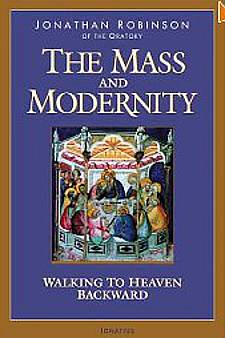At the Lamb’s high feast we sing, Praise to our victorious King,
Who hath washed us in the tide, Flowing from his pierced side;
Praise we Him, whose love divine, Gives His sacred blood for wine,
Gives His body for the feast, Christ the Victim, Christ the Priest.
 Slik starter tredje hoveddel av boka «The Mass and Modernity» som jeg nevnte for noen dager siden, og fortsettelsen er slik:
Slik starter tredje hoveddel av boka «The Mass and Modernity» som jeg nevnte for noen dager siden, og fortsettelsen er slik:
The Church at her deepest, truest level is the living presence of Christ working among us, and in us, through his sacraments. Christ came to share in our humanity so that every one of us could become partakers of his divinity. We are presented with this truth every time we go to Mass and the priest says at the offertory: «By the mystery of this water and wine may we come to share in the divinity of Christ, who humbled himself to share in our Immunity.»‘ We may not always sense his presence; there will be times of obscurity and darkness; but in a faithful and serious sacramental life, we know that God is gradually remaking us into the image of his beloved Son. And, just as the Father was well pleased with the Son, so he will be well pleased with us – if we remain in the Son.
In harmony with this understanding of the Church and sacraments, we have already noted that Vatican II taught that the liturgy is the summit of all the Church’s activities and the source from which all her power flows and that, in the liturgy, «the work of our redemption is accomplished.» The Catechism of the Catholic Church takes up this theme and quotes Vatican II’s Constitution on the Sacred Liturgy, saying that the liturgy gives to the faithful the power to bring home to themselves and to others «the mystery of Christ and the real nature of the true Church». ….
… Liturgy matters, then, because one of its main purposes is to point the worshipper toward the truth; to remind him that he must go beyond himself and his community to the God who is, who was, and who is to come. The liturgy should teach and help the worshipper to experience in a deep way that is more than verbal that his need for goodness, for truth, for beauty, and for love we grounded in the reality of God.
But the seeds of a genuine renewal «fell upon thorns, and the thorns grew up and choked them» (Mt 13:7). The modem world has been increasingly dominated by the theory and the practice of secularism. And then, too, the flavor of postmodernism is everywhere. ….
There are different strands that have contributed to this condition. Many of these strands that we have dealt with, such as the Enlightenment with its concern for justice, human rights, and due process, or again, the «rise of modem science», with its applications in health and technology, or the Romantic Movement with its historical, communitarian, and imaginative concerns, have persuasive and desirable elements, and I have been at pains to underline this side of the matter. Nonetheless, the overall thrust that carries them is hostile to the Christian revelation. The efforts of various sorts of Christians to accommodate the gospel in order to make it acceptable to the world has proved to be, not surprisingly, destructive of the Christian message. …
I fortsettelsen ser Fr. Jonathan Robinson på hva dette har medført (av skader) på liturgifornyelsen på 60-tallet.
